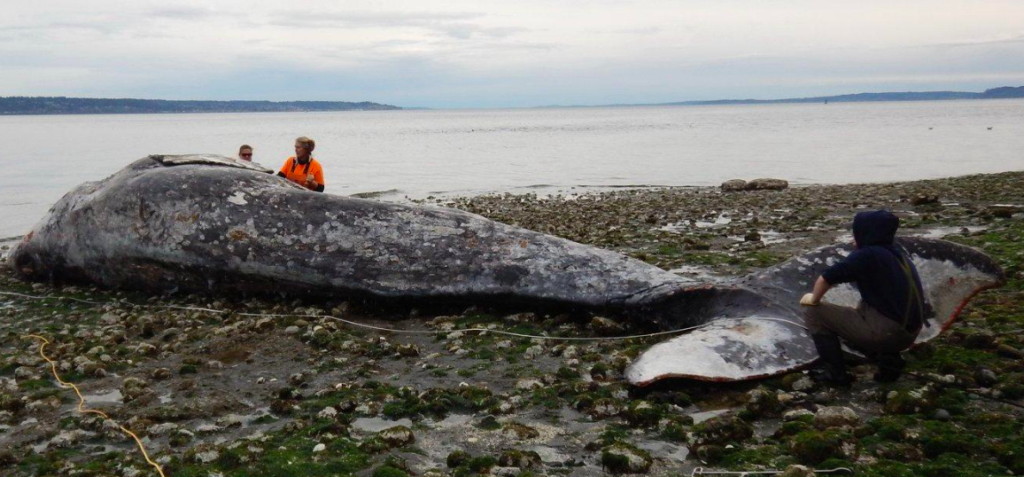
Gray whale found dead near Seattle on April 15. Photo: Cascadia Research Collective
Due to spikes in whale mortality on both coasts, the National Oceanic and Atmospheric Administration (NOAA) is stepping up its efforts to tackle one of the leading causes of death — whale entanglement in fishing lines and nets. This week a group of 60 fishermen, scientists, conservationists, and state and federal officials are meeting to discuss how the industry can protect the highly endangered North Atlantic right whale without unduly restricting fishing. The goal is to reduce right whale serious injuries and deaths from entanglement in fishing gear in U.S. waters from Maine to Florida to zero — which is the level mandated by the Marine Mammal Protection Act and NOAA given the declining right whale populations on the East coast.
- One of the participants in the process, Patrick Ramage, the Marine Conservation Director at the International Fund for Animal Welfare said, “In a status quo scenario, state and federal bureaucrats, fishermen, researchers and NGOs all keep doing their jobs and the right whale goes extinct. Stakeholders around the table took that challenge seriously this week. What’s missing is political will in Washington.”
A similar meeting will take place next month on the West coast as fishermen, scientists and government representatives along the Oregon and Washington coasts will meet to discuss whale entanglement risk reduction strategies. But in the meantime, 21 gray whales have washed up dead along the California coast and nine more in Oregon and Washington this year, which is five more than in all of 2018, and peak season for whale deaths does not even begin until May. One of the scientists involved in the conservation efforts on the West Coast told the NW News Network that the whales migrating this year are skinnier and are hypothesizing that these whales probably didn’t get fat enough during their summer feeding in Alaska last year.
- “We’re seeing very thin whales with little to no food in their stomachs,” Jessie Huggins of the Cascadia Research Collective said in an interview with NW News Network on Wednesday.
- Meanwhile, whale conservation groups are searching for a young gray whale they had been trying to free from fishing gear near Laguna, California this week.
Why This Matters: This week in Canada a group of high-level environmental ministers is meeting to explore ways to work together to achieve the ambitious target of saving 30% of the planet for nature by 2030. The Canadian government took the important step yesterday of announcing that it will now ban oil and gas drilling in its marine parks. This is important progress in waters that are important to many marine mammal species. Hopefully, the Canadian and the U.S. governments will work together to level the playing field for fishermen in both countries when it comes to whale conservation and will do whatever else they can to conserve both right whales in the Atlantic and gray whales in the Pacific. Ramage warns that the U.S. government “must act fast to fund and facilitate a swift transition to 21st-century fishing gear and policies that promote the survival of two endangered species: North Atlantic right whales and New England lobstermen.”
April 25, 2019 » #CampaignforNature, endangered species, entanglement, gray whales, International Fund for Animal Welfare, North Atlantic Right Whale, whales


